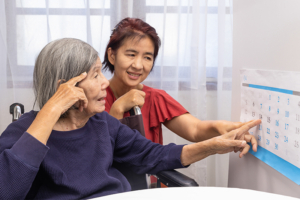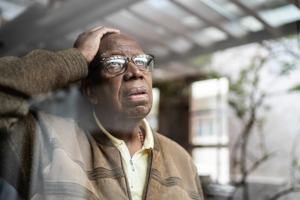Why Meal Prep Is a Great Activity for Someone With Alzheimer’s

Working together on the tasks related to preparing meals can be an incredibly beneficial activity for someone with Alzheimer’s.
There is something so special about the kitchen. It’s the first stop kids make once they arrive home from school, in search of a snack as well as the chance to share about their day. It is the spot family members gather to cook holiday meals together. It’s also a place to heat up a cup of milk and find some quiet, reflective solace when sleep is elusive. And, it’s a great place to engage in a meaningful activity for someone with Alzheimer’s.
For a person with dementia, the kitchen can bring to mind cherished memories. Cooking engages all of the senses, making it an excellent activity to unlock the doors of reminiscence. The rhythmic chopping of vegetables, the sizzle of ingredients in a pan, and the tantalizing smell of a well-seasoned dish can stir happy memories, sparking joy and connection.
If you’d like to add culinary techniques to your dementia care toolbox, these suggestions will help.
- Keep it simple. Use uncomplicated recipes with familiar ingredients to build a sense of accomplishment. If the person has a box of recipes or favorite cookbook, this is a fantastic place to begin. Pull out several recipe options that would be easy to prepare, and then see which ones may spark interest. Or, you can search on the internet for simple recipes according to the person’s particular tastes.
- Make it personal. Think about the preferences and capabilities of the individual. Activities such as kneading dough, rolling out cookies, or tossing a salad can be empowering, confidence-boosting, and reinforce a sense of purpose while triggering memories.
- Organize in advance. A structured approach, with ingredients lined up and ready and step-by-step instructions provided, will help ensure a more seamless and enjoyable experience.
- Stay social. The idea should be to make the activity a time of togetherness, transforming the kitchen into a warm space where stories are exchanged, laughter is shared, and bonds are strengthened.
The end goal should never be to create a Pinterest-worthy culinary production. Rather, focus on all the senses being used and draw on any memories that may come to the surface.
Perhaps, for example, you are making an apple pie. You can talk about how smooth the crust feels while you roll it out and the powdery flour that puffs into the air while you sprinkle it on the dough. Point out the sound of the apples being chopped, the delicious cinnamon butter aroma as the pie bakes. And of course, enjoy a piece of the finished product together, encouraging any stories along the way that the individual would like to share.
At Responsive Home Care, our experienced dementia caregivers are on hand to implement a culinary activity for someone with Alzheimer’s, or a wide variety of other creative and meaningful pastimes. Contact us at 954-486-6440 for more information on our dementia care services in Fort Lauderdale, Deerfield Beach, Plantation, and the surrounding areas.











